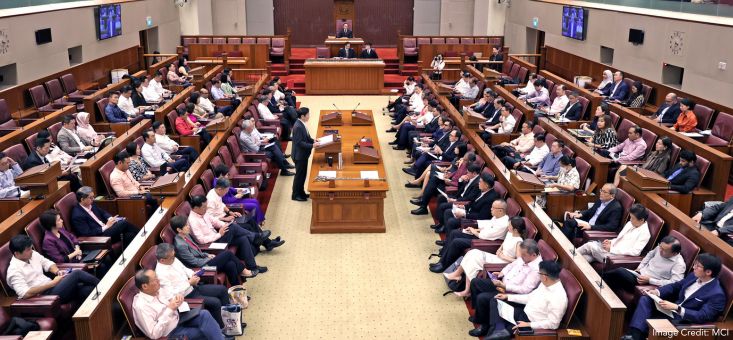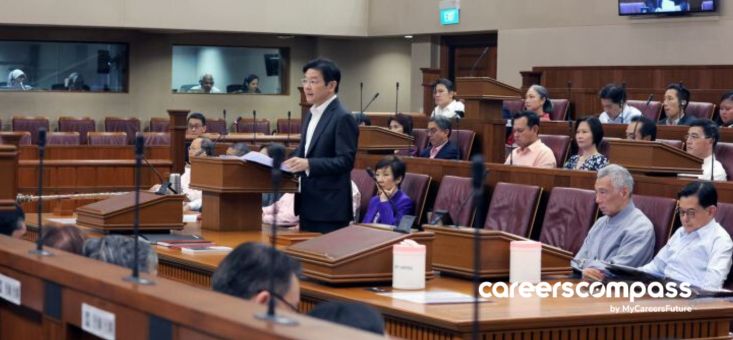In a Facebook post ahead of the 2024 Budget Statement delivered on 16th February 2024, Deputy Prime Minister (DPM) and Minister for Finance Lawrence Wong shared that the budget would be the “first instalment of plans set forward in the ForwardSG roadmap.”
“It is a budget to keep Singapore moving forward, equip our citizens to realise their full potential, and give more assurance to our families and seniors amidst a more troubled world.”
Elaborating in Parliament during the Budget Statement, DPM Wong added: “For 2024, the outlook is mixed. Geopolitical risk continues to loom large, and conflicts can escalate leading to disruptions to global supply chains and energy markets.
“But there are upsides, with the global electronics industry expected to recover. Meanwhile Asia continues to be a key driver for global growth.
“Overall, we are cautiously optimistic that 2024 will be a better year, with lower inflation, with higher gross domestic product (GDP) growth from 1-3%.”
Investments in Singapore’s future
DPM Wong elaborated on the following measures to continue to build and grow Singapore’s economic prospects:
- $3bn will be further invested in the Research, Innovation and Enterprise 2025 (or RIE2025) plan.
- The National Productivity Fund will receive a $2bn top-up to support investment promotion efforts.
- The Financial Sector Development Fund will also receive a $2bn top-up. This will give the Monetary Authority of Singapore (MAS) more resources to take advantage of current opportunities to extend Singapore’s lead in the financial services sector. Core areas of banking, capital markets, asset management and insurance will be targeted, but also new areas like FinTech, as well as green and transition finance.
- Plans for Singapore to go further in the Artificial Intelligence (AI) industry through our National AI Strategy 2.0 was revealed, with an additional $1bn to be invested over the next five years. Further investment will also ensure Singapore can secure access to advanced chips that are key to AI development and deployment, and the government will work with leading companies to set up AI centres of excellence in Singapore to spur innovation.

Increasing the expertise of Singapore’s workforce
“The enhanced Assurance Package and the Enterprise Support Package will provide some near-term relief to Singaporean households and firms. These are needed during this period when inflation, while moderating, remains on the high side,” said DPM Wong.
“But they are not permanent solutions. Over the longer term, the best way to deal with inflation is to ensure that our firms and workers are more productive, and that real incomes continue to rise sustainably.”
While the Singapore workforce ranks high in terms of skill and technical proficiency, technological advances mean expertise is in constant flux.
“Jobs like data entry clerks and door-to-door salesmen have dwindled in numbers”, said DPM Wong. “New jobs that did not exist decades ago, like data scientists and digital marketers are now in demand.
“Robots and machines will not completely replace humans at work, but they do change the way expertise is defined and how value is created.
“This means that Singapore has to invest even more in human capital and help its workers refresh and update their skills,” DPM Wong added.
Here are some of the key pillars of Budget 2024 that will be of interest to local workers, jobseekers and employers.

Mid-career and middle-aged workers to get reskilling and upskilling boost
DPM Wong shared the origins of SkillsFuture in Parliament.
“People and talent are critical to our economic dynamism. We are investing heavily in our human capital, including in preschool and education.
“But learning cannot stop when formal schooling ends. That is why we launched SkillsFuture – to systematically support Singaporeans in reskilling and upskilling, and equip them throughout life.”
As such, mid-career Singaporeans in their 40s and above will receive help in making real strides to upskill and reskill themselves, especially in this fast-changing job marketplace.
In Budget 2024, they will receive support with a new SkillsFuture Level-Up Programme, which will provide:
Support for further education courses
Currently, the Mid-Career Enhanced Subsidy (MCES) covers up to 90% of course fees for courses funded by the Ministry of Education (MOE) and SkillsFuture Singapore (SSG).
From May 2024, all Singaporeans aged 40 and above will get a SkillsFuture Credit top-up of $4,000 (which will not expire) will further offset out-of-pocket course fees for selected courses that are oriented towards meeting industry and employment needs.
The SkillsFuture Credit was first introduced in Budget 2015 to encourage Singaporeans to take ownership of their skills development.
DPM Wong said this top-up can be used for “selected training programmes with better employability outcomes,” which includes part-time and full-time diplomas, post-diplomas, undergraduate programmes, as well as courses for Progressive Wage Model (PWM) sectors.
Financial support while upskilling and reskilling
During Budget 2024, DPM Wong empathised with Singaporean workers trying to juggle upskilling and reskilling, and acknowledged that quality learning and skills training is not just about attending a one or two-day course.
He said: “Workers may need weeks or months of training to get a proper skills reboot, especially if they are looking to move to a different area of work.
“Even if they stay in the same industry, they will need a substantial injection of skills from time to time to stay relevant.
“But we know that taking time off from work to attend training courses over an extended period is not easy, especially for those in their 40s and 50s with financial and caregiving obligations.”
As such, a new SkillsFuture Mid-Career Training Allowance will be available in 2025 for Singaporeans who are taking up selected full-time, long-form training courses or programmes.
This provides for an allowance based on 50% of one’s average income, calculated over the latest available 12-month period, and will be capped at $3,000 per month. Every individual can receive up to 24 months of training allowance throughout their lifetime.
Details for both initiatives, such as eligible courses, will be announced by the Minister of Education at the upcoming Committee of Supply (COS).
Support for the involuntarily unemployed
DPM Wong also shared on a temporary financial support scheme that will be introduced later in 2024 to support those involuntarily unemployed.
“Losing a job is a major setback for workers and their families,” he emphasised.
“Those who become involuntarily unemployed naturally feel the pressure to rush into the first available job they find, but the new job may not always be a good fit.”
As such, the temporary financial support scheme will aid the involuntarily unemployed while they undergo training or look for jobs that are a better fit.
The scheme must be designed “carefully”, DPM Wong admitted, to avoid the issues that other countries experienced when they introduced unemployment benefits. More details on the scheme will be announced later this year.

Increasing wages for lower wage workers
Over the last decade, Singapore has made progress in uplifting lower-wage workers and reducing disparities in wages.
Income inequality has declined to its lowest level over two decades, DPM Wong revealed. But further adjustments will be made for lower wage workers.
From 2025, the Workfare Income Supplement (WIS) scheme, which tops up the salaries of lower-income workers to help them save for retirement, will be enhanced.
Firstly, the qualifying income cap will be raised from $2,500 to $3,000. This ensures that Singapore continues to cover lower-wage workers, even as their wages grow, says DPM Wong.
Secondly, Workfare payouts will increase. Lower-wage senior workers will qualify for a maximum annual payout of $4,900, up from $4,200 today.
In addition, the Local Qualifying Salary (or LQS) for full-time local workers at companies that hire foreign workers will be raised from $1,400 to $1,600 from this year. The minimum hourly rate will be increased from $9 to $10.50 per hour.
This increase ensures Singapore keeps pace with wage growth, DPM Wong said.
Support for employers of lower-wage workers
In 2022, Singapore introduced the Progressive Wage Credit scheme (PWCS), where the Government co-funds the wage increases of lower-wage workers with employers.
To help employers cope with rising business costs, the co-funding levels for 2024 will be raised from a maximum of 30%, to a maximum of 50%.
In 2025, the scheme’s wage ceiling will also be raised from $2,500 to $3,000, in tandem with the increase in the qualifying income cap for Workfare, said DPM Wong, adding that the PWCS fund will be topped up by $1bn to provide for these enhancements.
SkillsFuture Enterprise Credit extended by a year to June 30, 2025
Currently, eligible employers for the SkillsFuture Enterprise Credit can receive a one-off sum of $10,000 to cover up to 90% of out-of-pocket expenses on qualifying costs for supportable initiatives, over and above the support levels of existing schemes.
The scheme will be extended, so employers will also have an additional year to claim any unused credit.
Firms are encouraged to make efforts to restructure and transform, and DPM Wong added: “I encourage all firms to make full use of these schemes, so that they can thrive and succeed amidst a more challenging operating environment.”
PACT scheme to be enhanced
One way for Singapore small and medium enterprises (SMEs) to level up quickly is to partner with multinational firms based here.
There is already the Partnerships for Capability Transformation (or PACT scheme) to support such collaborations. Companies with a skill deficit in a certain area can leverage on government funding to learn from larger or similarly sized companies who have integrated that skillset within their operations.
The scope of such project is usually within the fields of integrating new technology, improving supply chain, co-development and testing of new products, improve cashflow management, pursue international projects, and pooling resources for economies of scale or marketing efforts.
This will help SMEs enter growth industries, new economies, and win high tech business by upgrading their capabilities through partner companies they typically already have established relationships with.
Larger companies, on the other hand, can leverage on smaller SMEs and startups to test-bed innovative solutions.
At Budget 2024, it was announced that the PACT scheme will be enhanced to support partnerships in more areas — capability training, internationalisation, and corporate venturing — to help more SMEs plug into global supply chains and compete in markets abroad.
Budget 2024: equipping Singaporeans to realise our potential
DPM Wong admitted that the road ahead for Singaporeans would not be easy, with a world that will become “more violent, more fragmented, and more unpredictable in the years the come.”
But cited the various storms Singaporeans have weathered over the years, from the 1997 Asian Financial Crisis and SARS to the more recent Covid-19 pandemic.
Yet “each time, we were able to weather the storms, and emerge stronger”, DPM Wong rallied.
He concluded: “Budget 2024 is about acting on this belief. We are helping Singaporeans with their cost-of-living concerns.
“We will grow the economy. We must. For growth is the pre-requisite to create better jobs and raise living standards for all Singaporeans.
“We will equip everyone to realise their potential and ensure that everyone benefits from our nation’s progress!”
Follow us on LinkedIn for more expert career guidance and industry insights: Workforce Singapore LinkedIn
Stay updated with the latest trends, job market shifts and career health advice from WSG.
(Main Image: MDDI)















